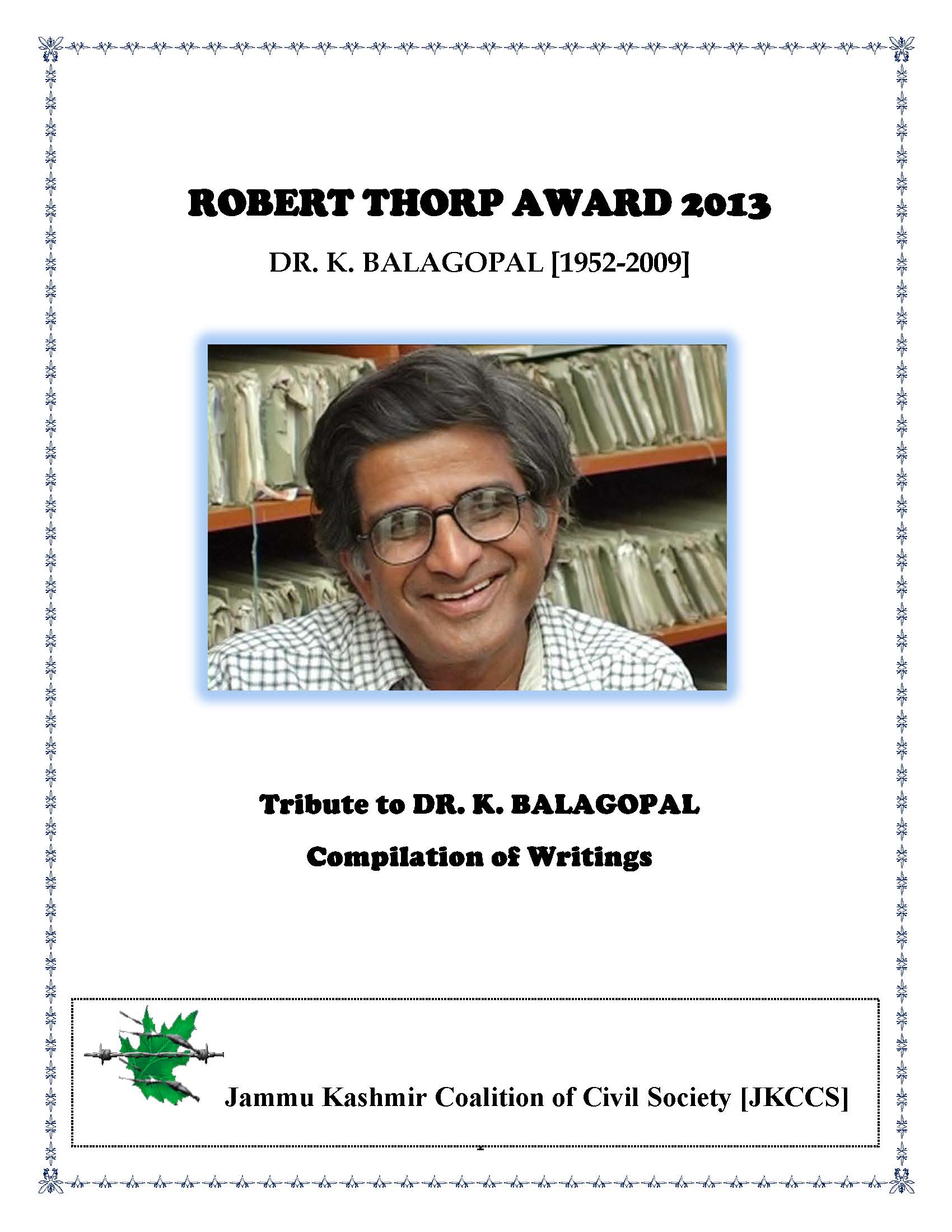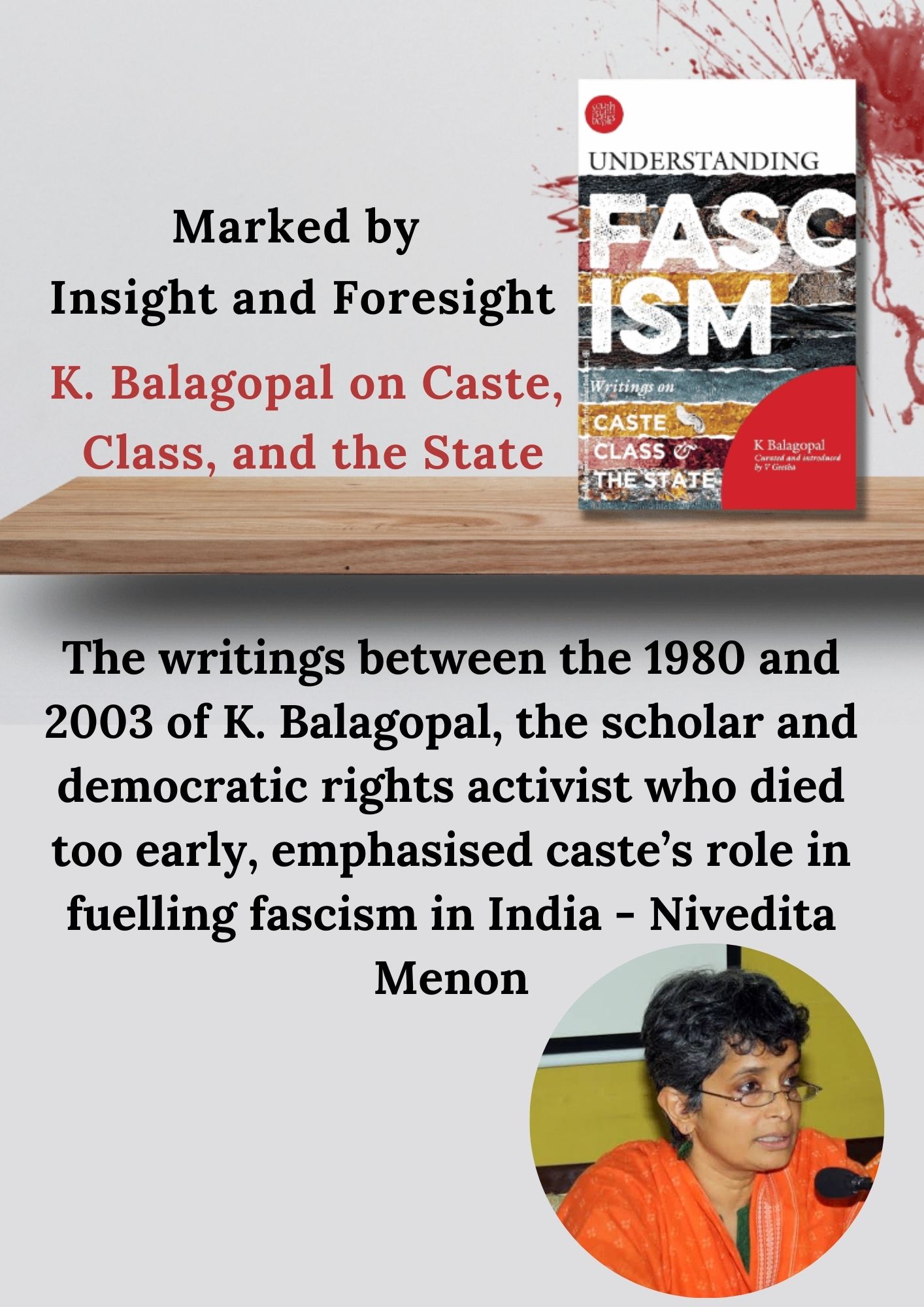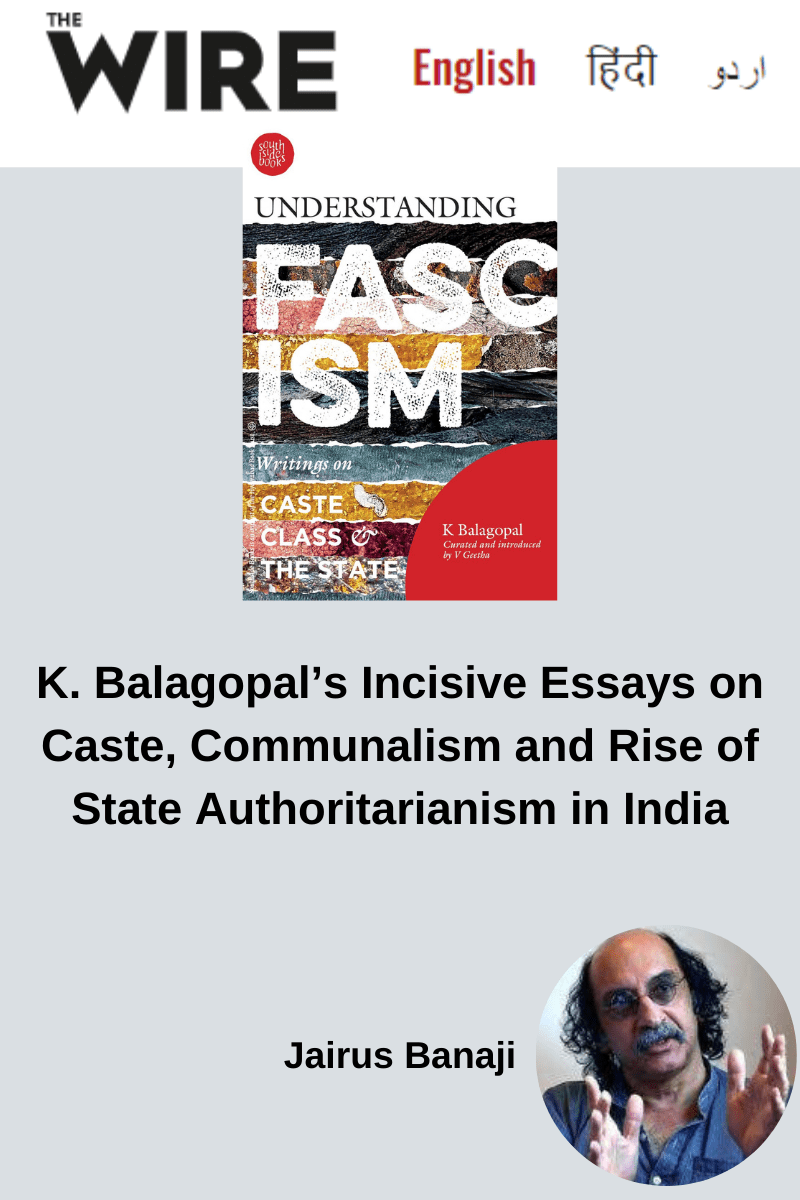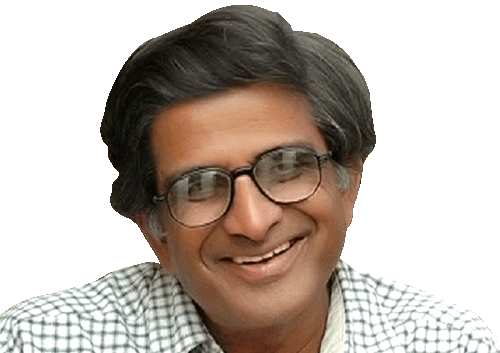How can late K. Balagopal’s learnings on the ground benefit academia today
In his writings, Balagopal has revisited the concept of ‘universal’ in a way which I believe, can be visited by us, students and academics, and which may carry the potential to resolve interdisciplinary antagonisms, writes Anamika Das.
I have been a student of sociology for more than seven years of my higher education, and have had the privilege and opportunity to be trained in what is referred to as ‘elite’ institutes. As a result, I was trained by teaching faculty who have been well-versed in theoretical underpinnings within the discipline, and who were trained from institutes like the Jawaharlal Nehru University, University of Hyderabad, Delhi University, among other well-named institutes. Their ability to introduce us to areas of thought which could never spark in our minds in a language they taught us in, pushed us towards viewing various forms of inequalities and discrimination, within the society. Over time though, I realise that faculty, departments, scholars, students, have among them various methodological animosities which one cannot particularly and concretely name. For instance, reiterating from my own experience, disciplines that roughly fall under the ‘social sciences’ have held some antagonism towards newly emergent disciplines such as cultural studies, performance studies, trauma studies and so on. It is not necessary that either parties know the grounds in which the other is based, or stands. Perhaps the antagonisms are departmental, personal even. But it can be felt very commonly. The difficulty of writing about such antagonisms is that they cannot be proven as anything concrete; they are simply currents that can be felt.
On one hand, social sciences in some select elite universities, have arbitrary interpretations of what ‘science’ means, and in the Indian context, in case of having been influenced by the Marxist political-economy framework in such institutes, flinch at studies based on caste, sexuality and gender as central basis for analyses. On the other, departments and courses which emerge as a response to this orthodoxy, often tend to ground themselves too much on the specific ‘identity category’ de-historized from all structural constrains. There is no ‘in-between’, at least in the beginning years of one’s higher education in someelite institutes. After a point, it is of course our responsibility as students, to dig deeper and cultivate our political and ethical frameworks, but it is also necessary to ponder upon how to understand these problems. While on one hand the former can give rise to a rejection of studies on identity, performance of the same, role of body, sexuality and so on, the latter can give rise to romanticization of one’s own identity, as well as of other’s, policing in the name of ‘what ought to be’, and worse, joining hands with those forces of market who love utilizing crude identity politics as much as the so-called ‘critical thinkers’ – and both are equally dangerous, especially when enacted through individuals and organized politics as channels.
While I was thinking through these directions by the end of my Masters, the later years spent in other ‘elite’ institutes which gave me more nuanced views on the same phenomena. And it was the time-period right after my Masters, in my M.Phil, that I was introduced to human rights activist and intellectual, Kandala Balagopal; the period also aligned with some of my bitter-sweet exchanges with left spectrum politics as a student in Kolkata. A detailed and one of the only interviews by him in English on YouTube proved to be very illuminating in various ways. In the interview, he lays down a history of his break-away from the Maoist movement roughly at the start of the 1990s, when discussions between him, along with a few of his comrades, and the party began. It ultimately led them to break away completely, and forming the Human Rights Forum in 1998. Even so, Balagopal respected the ground effects that the movement had across many regions of United Andhra Pradesh, was always present after fake encounters killed revolutionaries, of which he wrote in detail, while simultaneously critiquing the loss of life and bloodshed caused to people due to tussles between both, state forces and revolutionaries. Balagopal’s writings in the English language are dispersed across several articles written for the Economic and Political Weekly, The Indian Express etc., and several also remain published in academic journals. In them, he has revisited the concept of ‘universal’ in a way which I believe, can be visited by us, students and academics, and which may carry the potential to offer solution to problems of antagonism mentioned above. As articulated by him in his interview, he says,
“…..You can never say, I am being oppressed. You have to say, oppression is wrong. That is the only way you can formulate a protest…moment you do that, the principle becomes universal – not universal in the sense of 100 percent universal – but it finds for itself a class which goes beyond you….”
K. Balagopal, of course made the above statement in the context of imagining and formulating a protest; any protest. He insists this in his writings on topics ranging from brute force used by state bodies, problems of displacement, nature of law enforcement establishments like courts, and their limitations etc., that the work of fighting for and claiming rights should not only be in the hands of a few functionaries like juridico-legal and statutory establishments, but should become a general social process in which every community and/or individual should be aware of what it means to live with ‘rights’. Even though the context may differ between the way in which Balagopal speaks about a ‘movement for rights’ and ways through which students of social sciences are needed to think of the ‘social’ within the realm of a given discipline, I believe, such an outlook towards understanding the ‘universal’ and the ‘particular’ is key for students. It gives a framework for how to think through empirical knowledge gained by various techniques we are schooled in. Though disciplines push us to learn how to ‘generalize’ from particular data received through research techniques, the generalization is often refused to be understood as value-laden phenomena, barring a few exceptions such as by sections propagating feminist methodologies. In other words, if generalization is arrived at from a moral position, it is dismissed as ‘biased’. So, is scholarship limited to researchers making observations, and publishing them? I am not saying that, that should not be the case; claiming that is foolish in today’s scenario which needs scholars to desperately build networks for attaining basic gainful employment in the field. But, I (maybe naively) believe that scholarship is a matter of conscience as well. Many shall deny this, but as someone specializing under sociology in the field of sexual violence, gender studies, sociology of law, I can argue that it is impossible to understand violence on specific bodies by establishing structural and historical constraints regulating the essence of law through a vast, meta-narrative alone. It is essential to understand dispositional inequality; the claim that an individual makes towards bodily integrity, privacy, dignity, which at once is embedded in a continuity that draws a line between particular to universal, wherein the universal keeps changing with the given context of the problem – caste-based violence of sexual nature, other kinds of sexual violence in public places, in familial or marital life, land dispossession, displacement of communities, failure of the judiciary in upholding the spirit of constitution, failure of constitution in giving enough power directly in hands of people etc. The ‘universal’ may change, because as Balagopal claims, there is nothing ‘absolute’ about it, but at any point, when we must think about life with dignity, about a better world, it must be articulated in a universal realm within a moral frame. Reiterating the above problem of antagonisms, this conundrum of ‘particular’ and ‘universal’ can be solved if thought in terms of understanding the ‘universal’ in Balagopal’s sense of an abstract realm, which has a strong moral framework, but also does not claim 100 percent totality.
Due to the history that Balagopal lived and through which he envisaged a movement for rights, a lot of his writings speak to the left spectrum as a whole. From parliamentary left to the non-parliamentary far-left, throughout the spectrum, there has been a hesitation regarding how to think through both law and its functionaries, as well as the Constitution of India. Law in most sociological theorizations which are influenced by the Marxist political economy framework, interpret it as a tool of State; a tool to exert direct force alongside armed and police forces. On a similar plane but with specific historical analyses, the constitution is located as ‘bourgeois’, liberal, with a framework that may incline towards supporting the propertied from the property-less. Balagopal in my opinion, has given the strongest response on what to do with the question of law, in that, he pushes us across select pieces and the interview, to imagine a society without law. Granted that law can be oppressive, but, what if there is no law? The most oppression shall be faced by those who are positioned at the most under-privileged rung of the society, as the privileged shall be able to organize resources in their favour, due to networks built due to caste-class relations. Therefore, a legal framework is essential; it is the responsibility of those who claim to work towards better life, to invert the essence of law should it prove to be on the side of dominant communities. A continuous critical outlook towards law, while recognizing law as an essential tenet of a civilized democratic society, is among Balagopal’s key contributions for students. An intriguing part is, thinkers who are inclined towards interpreting the Indian Constitution as an important document, whether in academia or activism, tend to hold the constitution as a foundation for imagining social change, and are critical towards law and policy that tend to go against the principles of the constitution. While Balagopal has given a distinct understanding of how the moral framework within the constitution is important and must be kept in mind to critique law, drawing from his notion of ‘universalism’, he also claims, that even the Indian Constitution has nothing absolute about it. It gives much less power to the people to fight for and claim their rights, to agitate, and hands excessive power to bureaucratic bodies and institutions to fight and imagine any form of social change. Therefore, in some contexts, it is not unadvisable to take social movements and people’s agitations as base-foundation to understand the demands for social change.
Every year, in the first week of October, on the occasion of K. Balagopal’s death anniversary, the Human Rights Forum organizes a public meeting entitled, the Balagopal Memorial Meeting, based on a theme of social and political importance. While I attended the last two lectures online due to the Covid-19 pandemic, this year, the meeting was held offline, with Arundhati Roy, Clifton D’ Rozario, Jaha Aara, and Mihir Desai as invited speakers, and the theme was based around ‘Hindutva and Democracy’. I had met Balagopal through his writings, but what I witnessed in the meeting was the way in which he remains alive in peoples’ memories as well. Several speakers had memories to share about him where he was mostly immersed in work, deep in thought, writing as he travelled, with a reticent sense of humour. Speakers who have not known him closely have been commenting in this memorial meeting series on how they are surprised to see people being deeply affectionate, respectful, or as one of the speakers this year said, ‘obsessing’ over him. As a participant in the meeting, one cannot miss it, leading us to think if there is a possibility of living a life with minimum or no contradiction between what one believes in, and what one lives. After his untimely demise in 2009, several obituaries remember his reticent sense of humour with cherish. In 2021, in a talk organized by the Bangalore International Centre, entitled, K. Balagopal: The Conscience of the Collective Self, Arvind Narrain too, recounted his sense of humour, recounting instances, and reminding us that his sense of humour was full of wit, while at the same time, consciously avoiding kinds of humour which lived through humiliation, putting another down. At the same time one can observe that in several of his writings, which include his essays on police atrocities and custodial violence, and the Anti-Mandal agitations, he used wit to attack the environment or even academics who made scholarly claims without any factual grounding or contextual understanding. For instance, the following are the opening lines are taken from his essay entitled, Anti-Reservation, Yet Once More, published in the Economic and Political Weekly in 1986,
” SOUNDS of the future are sending their echoes backwards. As one reads the posters and listens to the arguments one is filled with an indistinct sense of unease, a premonition of the scenes that are going to trample along the streets of this land twenty, thirty or forty years hence; a prescience that is more akin to a feeling of deja vu in reversed time. On the face of it there is nothing alarming about the picture; it is perhaps even slightly amusing. There are these hundreds of youths, boys and girls, well-fed and well-dressed, marching along the streets posters in hand and slogans on their lips. They are obviously more accustomed to picnicking than to agitating, for they are agitating as if on a picnic. Their slogans too do not belong to the world of Indian mass politics. They are, needless to say, mostly in English; and they have none of the sonorous resonance we are all accustomed to; instead they have the crisp brevity of stickers and ads.”
While such writing is not attacking at a personal level, it is nevertheless sharp and attacking as is needed. Using sharp wit and humour in scenario where one must take a stance, but all the while doing it maintaining ethical boundaries is another lesson to be learnt for students, academics and scholars from Balagopal. No matter how polemical, when writing loses track towards aimless antagonism towards other scholars, frameworks, disciplines, identities, politics that emerge from the same etc., with no sense of which path to take, such scholarship is being done to prove a point; for self-interest alone. Besides, I have observed, in vicinities which claim to possess intellectual acumen, merit, to be aware of the society in a critical sense, in a way in which the ‘masses’ are not aware, dialogue in the form of direct confrontation, impatient questioning even though right in its place, fails. Subtle, reticent, sharp and pointed criticism and that alone, works the best with such apparently-sophisticated audience, and contributes to an ethics of dialogue and writing.
The contributions made by K. Balagopal is enormous, more than half of which I do not have access to, due to my inability to read in Telugu. However, as emphasized by many thinkers, activists, scholars, lawyers etc., Balagopal’s writings in many ways, is truly unique, and may introduce students interested in politics, legal studies, sociology, with theoretical frameworks embedded in our local context, which may help research and scholarship better. Apart from that, even at a personal level, his teachings can orient young scholars in understanding aimless antagonisms which are difficult to track or follow in higher education, and in tackling it.
Anamika Das is a Ph.D scholar of Sociology at the University of Hyderabad.
Anamika-2-1




